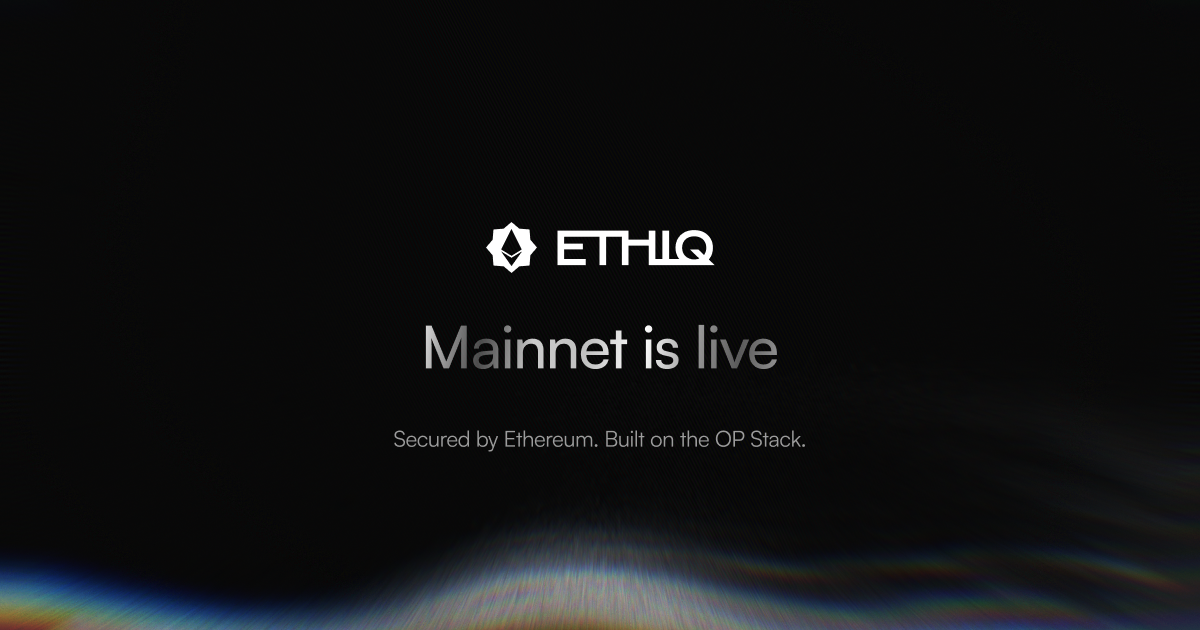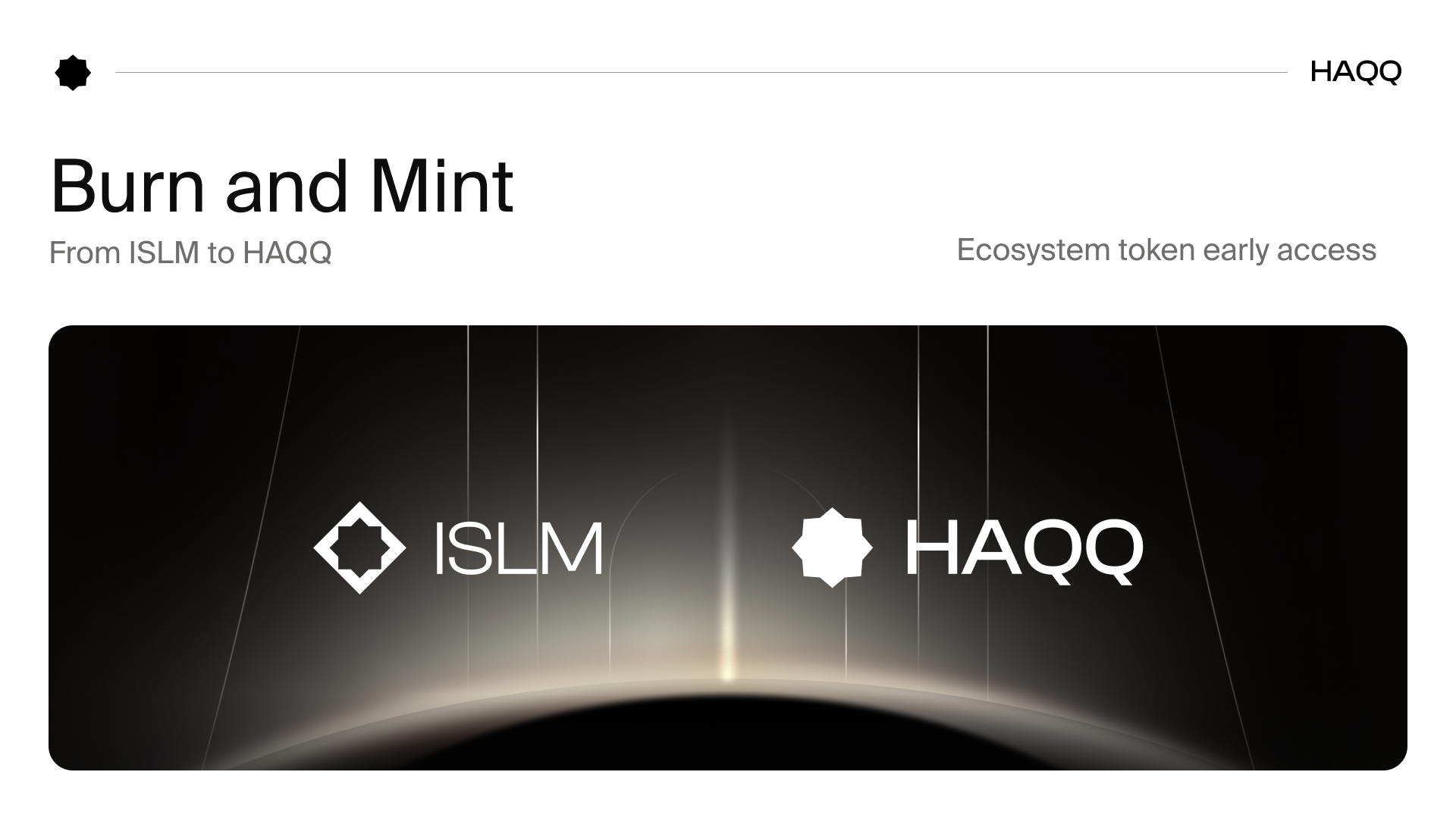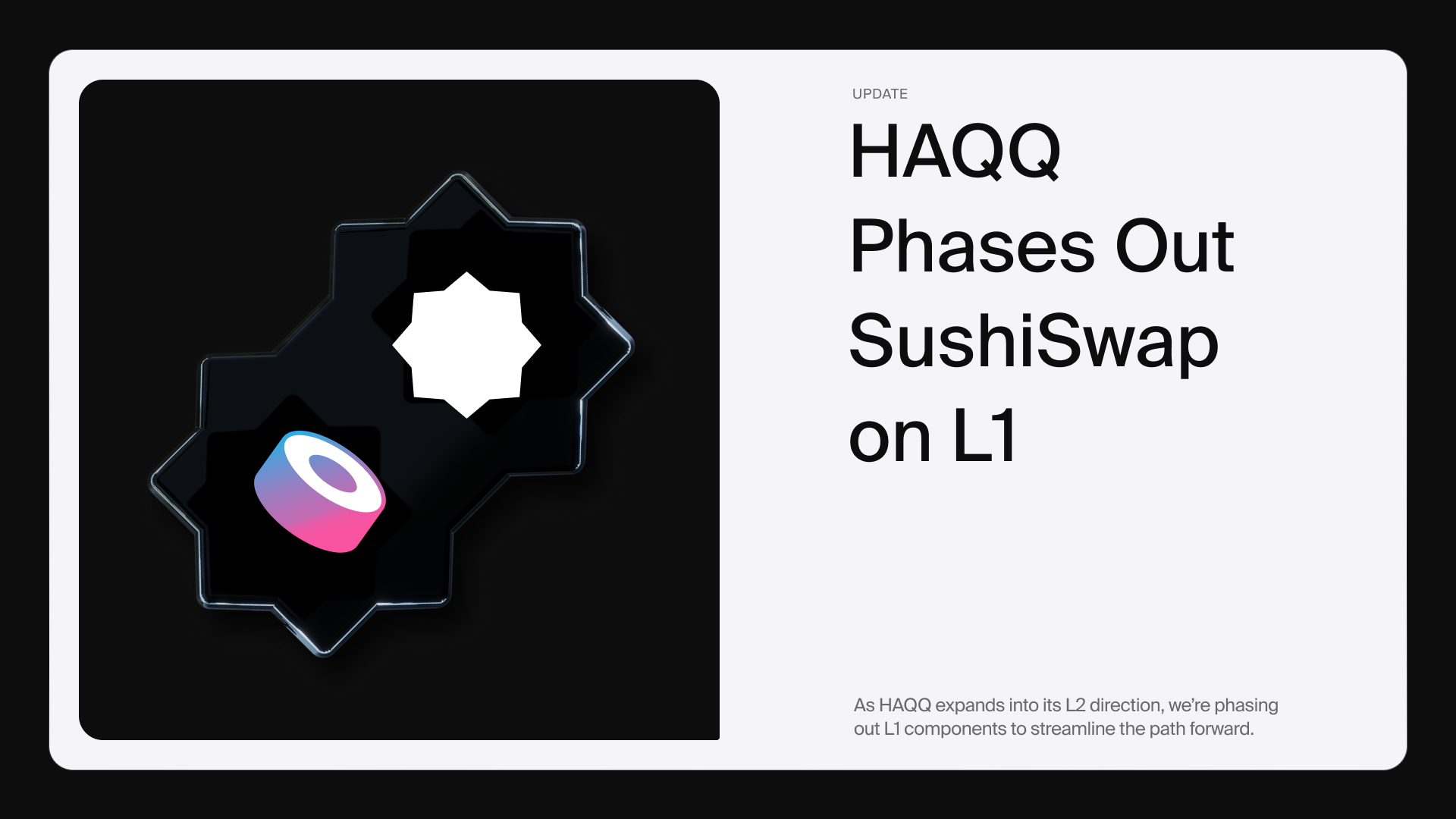
September 19, 2023 12:30 PM
Understanding the Tokenomics of the ISLM Token
In today's interconnected financial landscape, the global Muslim community of approximately 1.9 billion people grapples with a unique challenge: harmonizing Islamic finance's core principles with modern, interest-reliant economic systems. Enter Islamic Coin (ISLM), the native token of HAQQ. The cornerstone of this Shariah-compliant cryptocurrency lies in the Shariah Oracle, ensuring every transaction adheres to Islamic law, eliminating the need for interest, and establishing a genuinely ethical financial instrument. Beyond just removing interest, Islamic Coin is integrated with an Evergreen DAO to channel funds into Islamic social causes, allowing for governance that invests in ethical, community-focused initiatives.
Let’s dive into the various facets of the ISLM token's tokenomics, including its unique features and benefits that set it apart from existing financial instruments.
What is Tokenomics?
If you are new to the decentralized finance realm, here’s a quick overview of the essence of tokenomics. If you are a DeFi native, skip to the next section.
Tokenomics defines the economic model that governs a digital asset. More than just allocating tokens for various purposes, it establishes the framework for how a token will operate, how it gains and holds value, and how it interacts within the ecosystem it's part of. It influences everything from supply distribution to utility functions and the project's long-term viability. Understanding the distribution strategy, for example, is vital for token holders. It’s important to know who controls most of the supply and how those tokens will be distributed over time. It helps them gauge factors like market manipulation and the stability of the asset.
Furthermore, the governance structure around a token is essential. In the case of ISLM, governance is handled by the Evergreen DAO (Decentralized Autonomous Organization), a non-profit foundation aiming to foster long-term sustainability and community impact. This aligns with the broader Islamic principles emphasizing ethical finance and community development. More on the Evergreen DAO later.
Crucial to the ISLM tokenomics. The Proof of Stake (PoS) mechanism allows HAQQ holders to participate in the network consensus alongside validators. Stakers in the ISLM network are individuals or entities that lock a certain amount of their ISLM tokens in a staking mechanism. This enables them to participate in network governance, primarily via the Haqqers DAO, and earn staking rewards. Staking thus aligns with Islamic principles by allowing participants to be part of ethical finance mechanisms rather than simply holding assets that accrue interest. Islamic Coin may only be minted (issued) by those who contribute work and investment – validators and stakers of the network at a predetermined announced rate.
Validators are a more specialized set of network participants responsible for verifying and adding new transactions to the blockchain. These validators are chosen through a decentralized consensus mechanism. In the case of ISLM, these entities are especially crucial, as they help uphold the network's commitment to ethical financial practices, ensuring that each transaction aligns with Islamic law. ISLM bonders are validators who have "bonded" or locked up a certain amount of ISLM tokens as collateral.
ISLM Tokenomics
Islamic Coin (ISLM) is the native currency of HAQQ. It is used for paying transaction fees, governance, and staking. You can use ISLM tokens for various financial activities such as trading, lending, and staking, primarily within platforms that support the ISLM network. HAQQ and Islamic Coin are compatible with Ethereum, EVMOS, Cronos, Osmosis, and other chains operating on the Cosmos SDK. However, it's worth noting that the token is incompatible with platforms that engage in activities contrary to Islamic financial laws, such as Riba (interest) or Gharar (excessive uncertainty)
Initial Coin Distribution
The ISLM token starts with an initial minted supply of 20 billion coins, and the total supply is limited to 100 billion coins. The genesis block has been minted and distributed to private sale participants, early-stage partners, ambassadors, founders, and business reserves. Distribution is as follows: Business Reserve and Ecosystem Development Fund: 5.48 Billion Coins Reserved for future innovation, grants, and ecosystem enrichment. (1 billion is reserved for future Core Team incentives).
Partners: 5.47 Billion Coins For strategic relationships that drive network growth and ecosystem vitality.
Private Sale Buyers: 3.93 Billion Coins Intended for early investors, serving to jump-start initial development and operations.
Founders Compensation: 3 Billion Coins To compensate the founding team for their resource commitment and innovative drive.
Evergreen Foundation: 2 Billion Coins Allocated to ensure the network's longevity and ethical adherence to Islamic principles.

Block Rewards and Gas Fees
In the HAQQ ecosystem, block rewards serve as a pivotal incentive mechanism. Every time a block is added to the blockchain, it not only adds a set of new transactions but also generates new ISLM coins and gas fees. The distribution of these newly minted coins and collected fees is as follows:
Evergreen DAO: A fixed allocation of 10% of block rewards and gas fees goes to the Evergreen DAO. This DAO focuses on projects that align with Islamic principles, serving as a cornerstone for the network's vision.
Haqqers DAO: The allocation to Haqqers DAO ranges from 16.9% to 62.6%. The Haqqers DAO serves as a funding pool specifically designed for projects that are part of the Haqq ecosystem. Governed by ISLM stakers through a governance module, this DAO plays a significant role in directing the network's development trajectory, ensuring that projects aligning with the network's principles receive the necessary funding.
Remaining Distribution: After allocating to the two DAOs, the remaining part, which varies from approximately 27.4% to 73%, is divided as follows: Block Proposer and its Delegators: 5% of this remaining portion is given to the entity that successfully proposed the new block and its delegators. Bonded Validators and Their Delegators: The rest is distributed proportionally among all bonded validators and their delegators.

Reward Structure for Delegators
For delegators who have chosen to stake their ISLM coins with bonded validators, rewards are calculated proportionally based on the amount of their delegation relative to the total amount delegated to the validator. This total amount includes the validator's self-delegation. These rewards are given to the delegators after deducting the validator's commission. This ensures a balanced incentive mechanism that encourages long-term participation while compensating for the validator's role in block validation and transaction processing.
Staking and Governance
Staking in ISLM: How It Works
Staking is a critical feature in blockchain ecosystems that use a Proof-of-Stake (PoS) consensus algorithm. In ISLM's network, staking refers to locking up ISLM tokens in a smart contract to participate in the network’s governance and receive rewards. This locked-up amount acts as collateral and earns interest over time.
The staking process in the ISLM ecosystem allows you to delegate your ISLM tokens to a validator of your choice on the HAQQ. Once staked, your tokens validate transactions, secure the network, and implement governance decisions. In return, you earn staking rewards.
Excitingly, ISLM staking is now more accessible and potentially rewarding than ever, thanks to HAQQ's integration with REStake.app. This platform simplifies the staking process by providing an overview of all available validators, aiding you in making informed decisions. One notable feature of REStake.app is its ability to automate the compounding of your staking rewards. Instead of manually claiming and reinvesting your earnings, you can authorize your chosen validator to auto-compound your rewards. This feature is highly beneficial for maximizing returns, thanks to the wonders of compounded growth. For more, check out this blog post.
HAQQ has also partnered with Brighty, a leading fintech platform known for its comprehensive financial services, such as IBAN accounts, crypto wallets, and instant currency exchange. With this partnership, Brighty aims to tap into the Islamic Finance market, offering Islamic Coin (ISLM) accounts and enabling staking mechanisms. With Brighty, you can soon transact in Shariah-compliant crypto tokens like ISLM and partake in staking. Soon, this partnership promises to introduce services like linked cards, thereby making ISLM tokens even more accessible. For more, check out this blog post.
Governance through Evergreen DAO
In blockchain networks, governance refers to the mechanisms by which decisions are made, typically through proposals and voting. The Evergreen DAO (Decentralized Autonomous Organization) aims to fund various initiatives beneficial to the global Muslim community. Any staker of ISLM tokens can submit proposals, and these proposals are expected to first go through an off-chain discussion board for preliminary vetting and discussion. Following this, they are submitted to the Evergreen DAO with relevant metadata, which includes the spending amount and target. The Governance structure is as follows: Deposit Period: A proposal needs an initial deposit to be considered. If the minimum deposit is not met within a set time, the proposal is closed and transferred to Evergreen DAO.
Voting Period: A voting period is initiated once the minimum deposit is reached. The options are Yes, No, NoWithVeto, and Abstain. Initially, the threshold is set at 50% with a possibility to veto if more than 1/3rd of votes (not including abstentions) are NoWithVeto.
Shariah Approval Period: Post voting, the HAQQ Shariah Board reviews the proposal for its compliance with Islamic Law.
Unlike other DAOs, the Evergreen DAO has a unique component: the HAQQ Shariah Board. This board has the authority to review and approve each spending proposal to ensure it aligns with Islamic principles. If the Shariah Board approves a proposal, it gets executed, and coins are transferred to the destination defined in the proposal. If the Shariah Board rejects the proposal, coins stay in Evergreen DAO. If the Shariah Board doesn’t submit a decision in 21 days, a proposal gets automatically rejected, and coins remain in Evergreen DAO. Typically, in DAO governance models, deposits are often burned if a proposal fails. However, within Evergreen DAO, these deposits are transferred back to the DAO, supporting its long-term sustainability.
For more information on the ISLM tokenomics, please visit, download, and read details on our whitepaper.

Ethiq Is Live: Ethereum L2 for Liquidity and Economic Alignment
Ethiq is now live on Ethereum. Built on the OP Stack, Ethiq serves as the liquidity and application hub for the Haqq ecosystem, with a unified value layer designed to reward participation.
January 9, 2026 12:00 PM













